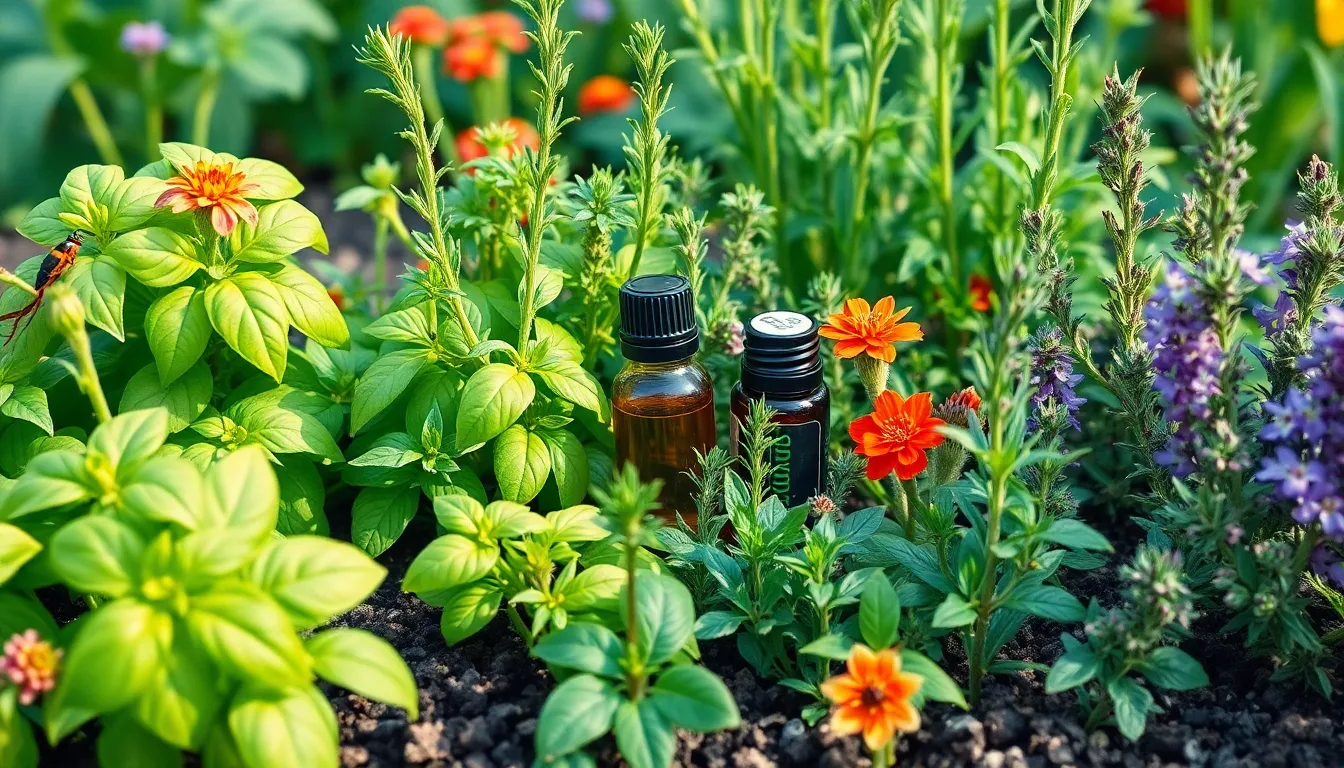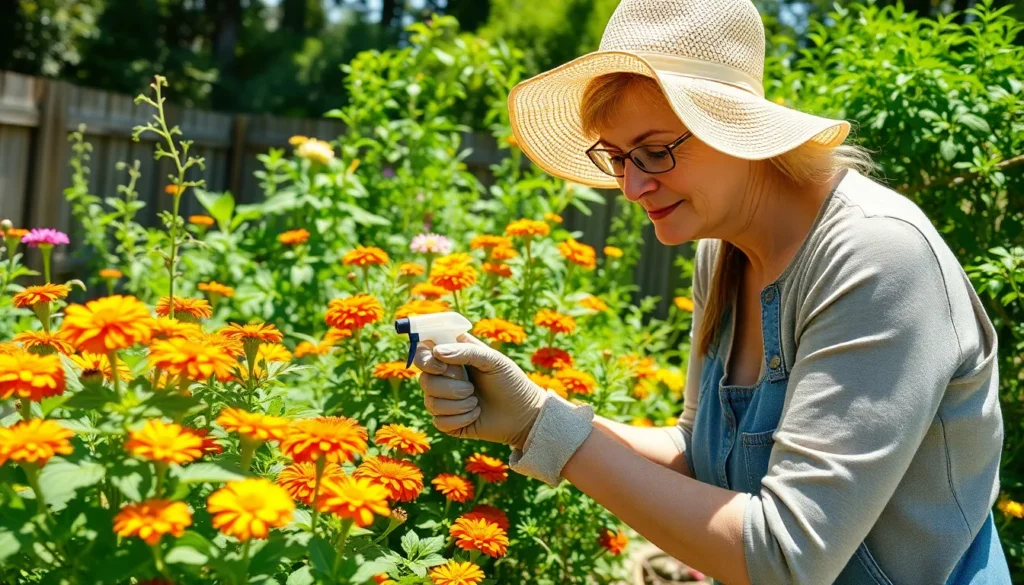When it comes to battling pesky intruders in the garden, most people reach for chemical solutions without a second thought. But what if there’s a way to keep those critters at bay without turning your backyard into a science experiment? Enter natural pest deterrents—the eco-friendly heroes of the gardening world.
Table of Contents
ToggleOverview of Natural Pest Deterrents
Natural pest deterrents provide an effective method for managing unwanted pests without harming the environment. These solutions harness the power of nature to protect gardens and crops. Common options include essential oils, plant extracts, and herbs.
Essential oils, such as peppermint and neem, serve as powerful repellents. Peppermint oil deters ants and spiders, while neem oil disrupts the life cycle of various insects, preventing infestations. Additionally, diatomaceous earth acts as a physical barrier against soft-bodied pests, damaging their exoskeletons and leading to dehydration.
Various plants act as natural repellents, enriching garden ecosystems. Marigolds, for example, repel nematodes and aphids. Basil not only enhances culinary dishes but also protects against flies, mosquitoes, and thrips. Interplanting these species can significantly reduce pest populations.
Another viable method involves using homemade sprays. Gardeners often combine garlic or chili pepper with water to create a potent deterrent. Spraying affected plants regularly ensures ongoing protection from pests.
Companion planting also plays a vital role in pest management. Certain plant combinations can attract beneficial insects. For instance, planting dill alongside cabbage attracts parasitic wasps that control caterpillar populations.
Encouraging natural predators forms a critical strategy for pest control. Birds, ladybugs, and lacewings feast on harmful insects, promoting ecological balance. Providing habitats, such as birdhouses or insect hotels, fosters these beneficial species.
Natural pest deterrents not only safeguard plants but also promote sustainable gardening practices. By adopting eco-friendly solutions, gardeners contribute to a healthier environment while minimizing chemical dependency.
Types of Natural Pest Deterrents

Natural pest deterrents include various eco-friendly options. These methods offer effective solutions for managing pests without harmful chemicals.
Essential Oils
Essential oils serve as potent repellents against many garden pests. Peppermint oil, for instance, effectively deters ants and spiders. Neem oil disrupts the life cycles of insects, acting as both a repellent and a pesticide. Citrus oils, like lemon or orange, repel a range of flying pests. Essential oils can easily be mixed with water to create sprays, allowing for targeted application on affected areas.
Herbal Remedies
Herbal remedies also provide natural pest control alternatives. Garlic creates an unpleasant odor for pests, making it an excellent deterrent. Basil emits scents that repel aphids and flies, enhancing garden diversity. Rosemary offers protection against beetles and other insects. By planting these herbs throughout the garden, gardeners create a barrier while boosting the ecosystem.
How to Use Natural Pest Deterrents Effectively
Using natural pest deterrents involves strategic applications and awareness of safety measures. Implementing these techniques ensures maximum effectiveness while protecting the environment.
Application Methods
Spraying diluted essential oils directly on plants repels pests. Exploring various combinations may enhance the effectiveness. Application of diatomaceous earth provides a physical barrier against soft-bodied insects. Positioning natural deterrents around the garden creates additional protective layers. Companion planting with herbs like basil and marigolds attracts beneficial insects, improving pest management. Utilizing homemade garlic or chili sprays offers targeted deterrence against specific pests. Administer these solutions during early mornings or late evenings for optimal results.
Safety Considerations
Ensuring safety involves using only food-grade essential oils and organic ingredients. Proper dilution of oils prevents plant damage and human exposure. Avoiding application on windy days reduces drift to unintended areas. Wearing gloves during preparation helps prevent skin irritation. Storage of homemade solutions in labeled containers ensures clarity and safety. Keeping natural deterrents out of reach of children and pets adds an extra layer of precaution. Adhering to these guidelines allows for effective pest management without compromising safety.
Benefits of Natural Pest Deterrents
Natural pest deterrents offer numerous advantages for those who seek to maintain a healthy garden. Environmentally friendly solutions minimize chemical exposure, promoting better health for both humans and wildlife. Cost-effectiveness arises from the accessibility of ingredients, making it easier for gardeners to create their own deterrents.
Sustainable practices enhance biodiversity in gardens. Companion planting attracts beneficial insects, creating a more balanced ecosystem. Enhanced soil health results from using organic methods, as natural deterrents contribute to nutrient-rich environments.
Increased safety provides peace of mind. Natural pest deterrents limit harm to users, pets, and beneficial organisms. Reducing chemical usage leads to fewer contaminants in air and water, fostering a safer outdoor space.
Effective results against pests occur without the risks associated with synthetic alternatives. Repellents like peppermint and neem oils target specific pests, leading to more reliable pest management. Homemade sprays featuring garlic or chili peppers deter a wide range of unwanted insects, allowing gardeners to customize solutions based on their specific needs.
Convenience plays a role in the appeal of these methods. Easy applications involve mixing essential oils with water or applying diatomaceous earth directly. Simple preparations ensure that even novice gardeners can integrate these solutions into their routines.
Long-term effectiveness stands out among the benefits, offering extended protection against pest invasions. Over time, natural deterrents can help deter pests that might otherwise develop resistance to chemical treatments. Maintaining pest control naturally means gardeners can enjoy healthier plants and a thriving garden atmosphere.
Natural pest deterrents offer a sustainable and effective way to manage garden pests while promoting a healthier ecosystem. By utilizing essential oils herbs and companion planting strategies gardeners can create a thriving environment that minimizes chemical use. These methods not only protect plants but also enhance biodiversity and contribute to nutrient-rich soil.
Embracing natural pest control fosters a safer gardening experience for both humans and wildlife. With a variety of options available from homemade sprays to attracting beneficial insects gardeners have the tools necessary for effective pest management. Adopting these eco-friendly practices ensures a flourishing garden that remains resilient against pests while supporting the environment.





